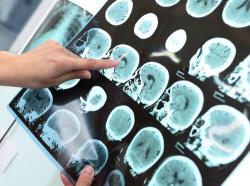 About one quarter of Americans carry the APOE-E4 gene, a known risk factor for late-onset Alzheimer’s disease.
About one quarter of Americans carry the APOE-E4 gene, a known risk factor for late-onset Alzheimer’s disease.
 About one quarter of Americans carry the APOE-E4 gene, a known risk factor for late-onset Alzheimer’s disease. In a recent study, researchers from Brown University and Banner Alzheimer’s Institute discovered discovered that infants who carry the APOE-E4 gene showed differences in brain development when compared to children without the gene. Their results have been published online in JAMA Neurology. “It may sound scary that we could detect these brain differences in infants,” Eric Reiman, MD, executive director of the Banner Alzheimer’s Institute in Arizona, stated in a press release. “But it is our sincere hope that an understanding of the earliest brain changes involved in the predisposition to Alzheimer’s will help researchers find treatments to prevent the clinical onset of Alzheimer’s disease — and do so long before these children become senior citizens.” Alzheimer’s is an irreversible, progressive brain disease that slowly destroys memory and thinking.
About one quarter of Americans carry the APOE-E4 gene, a known risk factor for late-onset Alzheimer’s disease. In a recent study, researchers from Brown University and Banner Alzheimer’s Institute discovered discovered that infants who carry the APOE-E4 gene showed differences in brain development when compared to children without the gene. Their results have been published online in JAMA Neurology. “It may sound scary that we could detect these brain differences in infants,” Eric Reiman, MD, executive director of the Banner Alzheimer’s Institute in Arizona, stated in a press release. “But it is our sincere hope that an understanding of the earliest brain changes involved in the predisposition to Alzheimer’s will help researchers find treatments to prevent the clinical onset of Alzheimer’s disease — and do so long before these children become senior citizens.” Alzheimer’s is an irreversible, progressive brain disease that slowly destroys memory and thinking.
Do I Carry the APOE-E4 Gene?
The APOE gene provides instructions for making a protein called apolipoprotein E, which combines with fats in the body to form lipoproteins that ultimately aid metabolism and the cardiovascular system. In particular, APOE has been shown to play a role in regulating cholesterol, a molecule that is involved in the development of gray matter and white matter brain cells. Scientists also believe the gene participates in regulation of amyloid, a protein that accumulates in the brains of individuals with Alzheimer’s forming a plaque that is frequently targeted by experimental treatments.
Individuals inherit one copy of an APOE gene variant from each parent, with APOE-e4, APOE-e2, and APOE-e3 being the most common. Scientists have identified the e4 variant, which is present in about one quarter of the U.S. population, as increasing an individual’s risk for developing late-onset Alzheimer’s disease. Research suggests that APOE-e4 is implicated in about 20 to 25 percent of Alzheimer’s cases. Yet, not everyone who carries the gene eventually develops Alzheimer’s. Over half (about 60 percent) of people who develop the disease have at least one copy of the E4 gene, while those who have inherited two copies of this particular allele are at even greater risk.
To investigate potential effects of this gene at the earliest possible stage of development, researchers from Brown University’s Advanced Baby Imaging Lab helped scientists design an experiment. Key to the study was a technique developed at Brown, whereby the MRI machine is quieted to a mere whisper, enabling imaging to transpire while babies sleep without medication. This unusual technique also enables imaging of gray matter — the part of the brain that contains neurons and nerve fibers — as well as white matter. Beginning shortly after birth, white matter growth is an important measure of brain development. Both white and gray matter are thought to play a role in Alzheimer’s. Having devised an experiment based on this new MRI technique, the researchers began their work.
Affected Regions of the Brain
The scientists began by DNA testing 162 healthy infants between the ages of two months and 25 months to see which variant of the APOE gene they carried: 60 were found to have the E4 variant. Next, the researchers imaged the brains of all the infants, using the specialized MRI technique described above. Then, the researchers compared the scans of E4 carriers with those of non-carriers.
The children who carried the APOE-E4 gene tended to have increased brain growth in areas in the frontal lobe, and decreased growth in areas in several regions in the middle and rear of the brain: the precuneus, posterior/middle cingulate, lateral temporal, and medial occipitotemporal regions. (Roughly, the precuneus is involved with episodic memory, reflections upon self, and aspects of consciousness; the posterior/middle cingulate is involved in emotion formation and processing, learning, and memory; the occipital lobe is the visual processing center of the brain.) Significantly, these decreased growth areas are the very same regions that tend to be affected in elderly patients who have developed Alzheimer’s disease.
“This work is about understanding how this gene influences brain development,” Sean Deoni, who oversees Brown University’s Advanced Baby Imaging Lab, stated in a press release. The findings do not indicate any of these infants will later develop Alzheimer’s disease. But the findings do suggest that brains of APOE-E4 carriers develop differently from those of non-carriers and do so from a very early age. It is possible, the researchers hypothesize, these early changes provide a “foothold” for the later changes that transpire in the brain, such as the development of amyloid plaque, all of which leads to the symptoms of the disease.
Source: Dean DC, Deoni SCL, Reiman EM, et al. Brain Differences in Infants at Differential Genetic Risk for Late-Onset Alzheimer DiseaseA Cross-sectional Imaging Study. JAMA Neurology. 2013.
(image: shutterstock)







